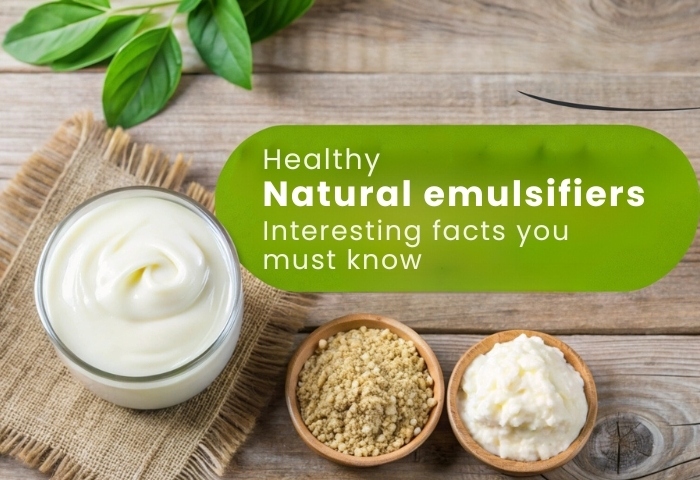Introduction to Natural Emulsifiers
Natural emulsifiers, sometimes referred to as organic binders or natural stabilizers, are essential substances used in a wide range of products, including food and drink, beauty products, and medications. They serve to stabilize and bind insoluble liquids—like water and oil—together to create a homogenous mixture. Taken more simply, they help in retaining chemicals that do not naturally combine in goods like sauces, lotions, creams, and even paints and agrochemical formulas. It is critical that you understand the importance of these substances, particularly as manufacturers and consumers move toward safer, more natural, and sustainable alternatives. Traditional emulsifiers, which are generally synthetic, might occasionally provide health or environmental risks. On the other hand, they offer a healthier, more environmentally friendly alternative that benefits everyone, not just humans.
The sources, uses, and advantages will all be addressed in detail in this informative guide. By the time you’ve finished, you’ll know exactly why manufacturers all around the world are starting to choose them.
What are Natural Emulsifiers?
These are the Substances obtained from plants, animals, or microorganisms that are useful in the blending of two insoluble liquids (such as water and oil). By reducing the surface tension and allowing the two liquids to mix without separating, these substances serve as a bridge between them.
Lecithin (found in soybeans and sunflower seeds), gum arabic (extracted from acacia trees), pectin (produced from fruits like apples and citrus), and carrageenan (extracted from red seaweed) are a few of the most well-known naturally produced emulsifiers. Because of their natural origin and capacity to produce stable mixes, these emulsifiers are valued highly.
Technically speaking, organic emulsifiers are amphiphilic, which means they have both lipophilic (which attracts fat) and hydrophilic (which attracts water) components. This enables them to communicate with water and oil to stabilize the mixture.
These are generally used in many different kinds of industries, including industrial preparations, pharmaceuticals, beauty products, and the food manufacturing business. They are excellent for goods that need to be applied or consumed over a longer period of time due to their disposable nature and generally little risk of allergic reactions.
Origins of Emulsifiers: Where Do They Come From?
Natural emulsifiers are broadly available and adaptable due to the capacity to be generated from a number of origins. Three primary categories involve various sources:
- Plants
- Lecithin : Soybeans, sunflower seeds, and other oilseeds contain lecithin, one of the most popular ones. Lecithin is very useful in food items like margarine, chocolate, and baked goods. It functions as a great stabilizer and blocks fat and water separation.
- Pectin : Apples and citrus fruits are used to obtain pectin, another plant-based emulsifier. Due to pectin’s capacity to stabilize and thicken mixes, it is frequently employed in sauces, jellies, and jams.
- Animals
- gelatin : Animal collagen is the source of gelatin , which is often found in candies, desserts, and marshmallows. It acts as a stabilizer and thickening agent, particularly in products that require a particular smoothness.
- Lecithin : a naturally occurring emulsifier, is found in egg yolks and is used to make mayonnaise and other creamy sauces. tiny organisms
- Microorganisms
- Xanthan gum : is produced by fermenting carbohydrates with the bacteria Xanthomonas campestris. Due to its exceptional thickening and stabilizing qualities, this is widely used in the food sector as well as in pharmaceuticals and beauty products.
Because Organic emulsifiers can come from a number of habitats and be employed in a wide range of goods, their various backgrounds make them highly flexible.
The Role of Emulsifiers in Food and Beyond
Emulsifiers are necessary for the food industry because they provide goods with their smooth textures, a longer lifespan, and better taste overall. Products like chocolate, ice cream, and salad dressings would soon separate without emulsifiers, losing their original flavour and texture.
Natural Emulsifiers in Food
- Lecithin : Chocolate contains lecithin to keep the cocoa butter from separating. Moreover, it gives a smoother texture. Fruits and algae provide the sources of pectin and agar-agar, which can be used in jams, jellies, and sweets to provide a solid gel-like substance.
- Gum arabic : Gum arabic is often utilized to preserve texture and avoid breaking in drinks, baked items, and sauces.
- Pectin and agar-agar: which originates from fruits and algae, respectively, are utilized in jams, jellies, and sweets to provide a solid similar to gel appearance.
Beyond Food: Industrial Uses
- Pharmaceuticals: In the pharmaceutical sector, natural emulsifiers retain the active ingredients in the form of liquids, making sure the medicine gives the proper dose regularly. Lipid emulsions administered intravenously generally contain lecithin.
- Agrochemicals: To improve the effectiveness and distribution of insecticides and fertilizers, emulsifiers are added to their mixtures. Carrageenan can be found in various agrochemical solutions to maintain the liquid formulations.
- Textiles and Leather: Emulsifiers help in the softening of fabrics and improving the condition of leather by allowing the even distribution of softeners or conditioners.
The Importance of Emulsifiers: Why Are They Used?
Emulsifiers are essential in many products because they block separation between water-based and fat-based substances. This is specifically significant in products with an excessive fat content, such as margarine or mayonnaise, where separation would strongly reduce the quality of the product.
Why Emulsifiers Are Added to Fats and Oils
Emulsifiers help fat-based products achieve stability. For example, in salad dressings or sauces, emulsifiers bind oil and water, producing a stable product that does not separate over time.
Benefits of Using Emulsifiers in Product Formulation
- Improved Shelf Life: Emulsifiers prevent the separation of ingredients, thus extending the shelf life of products.
- Enhanced Texture: Emulsifiers help maintain an uniform texture, which is crucial for consumer fulfillment.
- Better Flavor Distribution: Emulsifiers in food make sure that flavor is distributed equally through the dish.
Natural Emulsifiers: A Better Alternative
Natural emulsifiers offer a cleaner alternative to synthetic emulsifiers, which are commonly utilized but have the risk of causing negative health effects or harm to the environment.
Why Traditional Emulsifiers Can Be Harmful
Synthetic emulsifiers, like polysorbates, have been connected to diseases like digestive tract inflammation, allergic reactions, and environmental damage. They often originate from petroleum products, which can be harmful for the environment.
Benefits of Using Natural Emulsifiers
They are often biodegradable, non-toxic, and less likely to cause allergic reactions. For example:
Lecithin, derived from soy or sunflower seeds, is well-tolerated and used widely in both food and cosmetic products.
Beeswax : used in creams and balms, is sustainable and safe for the skin.
Mixing Oil and Water
lecithin, gum arabic, and carrageenan are ideal for mixing oil and water. They are less likely to cause allergies in humans or harm the environment, and they give an ideal replacement for artificial options.
Cosmetics and Skin Care
Natural emulsifiers are used in the cosmetics and beauty industry to make gentle, efficient products that are easy on the skin. In order to develop a stable product, these emulsifiers help in the attachment of oils and water in creams, lotions, and serums.
Benefits in Skin Care
Lecithin : Due to its hydrating and softening qualities, lecithin is a common ingredient in skin care products.
Beeswax: Commonly used in remedies and balms, it acts as an organic shield to keep moisture in.
Shea Butter: Because of its deep moisturizing properties, shea butter is rich, found in body lotions and hair conditioners.
Application in Cosmetics
hair care : emulsifiers in hair care products are helpful for mixing oils, water, and other ingredients to create smooth, easy-to-apply shampoos and conditioners.
makeup : In cosmetics, they provide smooth texture and application by stabilizing lip balms, primers, and foundations.
Industrial Applications of Organic Emulsifiers
Biodegradable Plastics
Natural emulsifiers are used in the production of biodegradable plastics for mixing various ingredients and improving the lifespan of the material. By making plastics that degrade faster in the environment, these emulsifiers contribute to an overall reduction in waste and pollution.
Lubricants
To make oil-water solutions, They are used in the manufacturing of lubricants for industrial use. These solutions are used in tools, machinery and equipment to increase the life of moving components by decreasing wear and friction. For this reason, lecithin and other plant-based emulsifiers are often used, which makes the lubricants more environmentally friendly.
Paints and Coatings
They are an essential component in the manufacturing of paints and coatings. They ensure smooth application by stabilizing colors and preserving the consistency of water-based paints.
Detergents
Natural emulsifiers are used in detergent and cleaning products to help break down fats and oils so that surfaces can be cleaned more easily. They increase the emulsification of grease, making it easier for removal with water and include plant-based substances called saponins and soapnuts.

